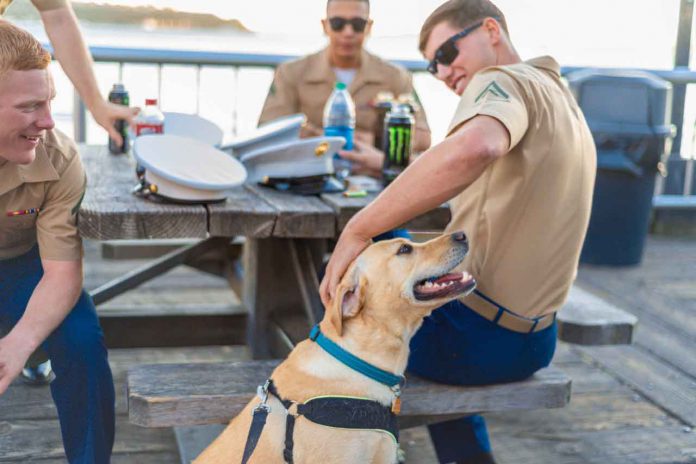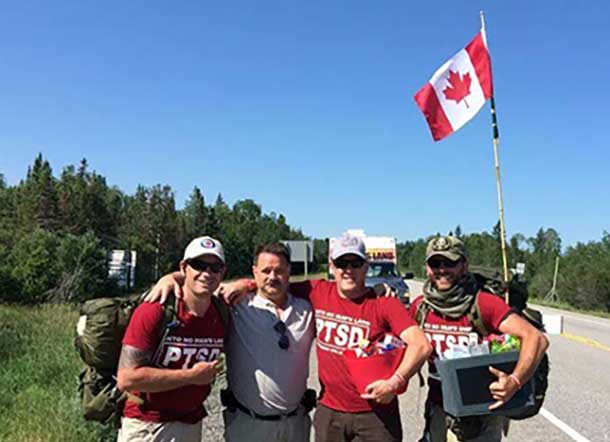Dogs are steadfast companions, the kind which is hard to find in the real world. Loyal canines can help veterans suffering from PTSD in many ways, and there are even rescues that specialize in homing dogs with veterans. It’s hard to put a tangible claim on a dog’s companionship, but here are some ways a dog can be an assistant in PTSD recovery.
1. They’re Loving Companions
PTSD can have a range of symptoms, but most cases lead to trust issues and loneliness. Dogs are the perfect way to help alleviate those.
Dogs love unconditionally and a trained service dog can be trusted implicitly. Service dogs are much more than just pets: they’re a life-changing companion.
Humans need companionship, it’s just how we’re wired. Many veterans face difficulties in returning to the civilian world after their duty is complete. A dog is often the right companion in those situations since they’ll follow orders and show affection.
Everyone can use a little bit more love in their lives, PTSD-stricken veterans doubly so. Dogs provide it and don’t ask for very much in return. There are a wide variety of dogs suited for the task, and all of them are here to help.
2. Clinically Proven Therapy
While some people show doubt about the effectiveness of service dogs for mental health treatment, science has more to say. They’re often used as an adjunct to therapy as well, where the effect is synergistic.
Studies have shown that service dogs most often result in decreased symptoms. Lessened depression and anxiety are two of the big ones for most people who struggle with PTSD. They can be a killer if not managed.
Those with service dogs also isolated themselves less and reported a higher quality of life. Their mental health improved across the board, although a dog certainly isn’t a “cure” for PTSD. Instead, they’re a valuable addition to the lives of those who are having difficulty.
Owning a service dog is therapy that feels like friendship. For many it’s a vital part of their mental health.
3. Dogs Help Forming a Routine
Coming from a military background often means years of routine. Losing it suddenly can be hurtful for anyone, but especially those who have symptoms of post-traumatic stress disorder.
Dogs need walks, food, and water. It’s not a lot, but most people are willing to make sure that they get done. After all, dogs don’t ask for much compared to what they give.
These simple tasks are the start of a routine. Making and keeping good habits is essential to recovery from mental illness, and PTSD in particular. Avoidance and anxiety can leave afflicted people in isolation, and depression can make it hard to just get through the day.
The relationship with a service dog can often overcome those hurdles and help form the basis of a healthy routine.
4. Staying Active
Exercise is one of the best things you can do for your mental health. Walking, or running, with your dog may not feel like a lot of work but it definitely helps with keeping active. It’s easy to become mired in symptoms and not want to move.
There’s more to it than daily walks, of course. Dogs are welcome companions on hikes and other more strenuous adventures and service dogs are welcome almost everywhere.
Dogs help with many of the individual puzzle pieces that make up mental health and keeping a suffering person moving is one of the most dramatic effects. That little walk each day leads to a much bigger end result.
5. There Are Specially Trained PTSD Dogs
In addition to emotional support animals, there are also dogs that are specially trained to help with PTSD. Unlike emotional support dogs, which simply provide companionship and a stable influence, these dogs are trained to manage symptoms.
In many cases, a person with PTSD can have extreme symptoms. These dogs are trained to recognize and provide help with feelings of isolation, extreme anxiety, and even with nightmares.
For those who suffer a severe case of this dire mental illness, these dogs can be lifesaving. They’re harder to find, but there are services that will connect psychiatrically trained dogs with their proper owners.
6. A Sense of Purpose
A dog depends on their master to provide for them. For many, this bond may be the only reason they’re able to get out of bed in the morning.
For veterans who lived years of their life with a singular purpose, feeling adrift in the aftermath of service can be overwhelming. Taking care of a service animal can help to bring back those feelings of purpose, even if it’s only in a small way.
It’s a much better option for most than to deal with their illness alone.
Conclusion
Dogs aren’t the only treatment option for veterans with PTSD, but they’re an amazing adjunct to traditional methods of therapy. They also offer a special friendship that simply can’t be found with other humans, bring their owners back to life with purpose and routine. For many, these dogs are much, much more than companions… they’re life savers!



